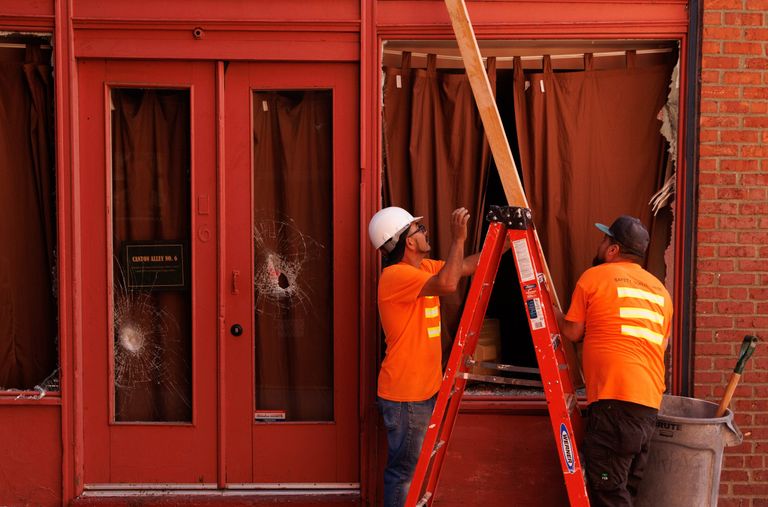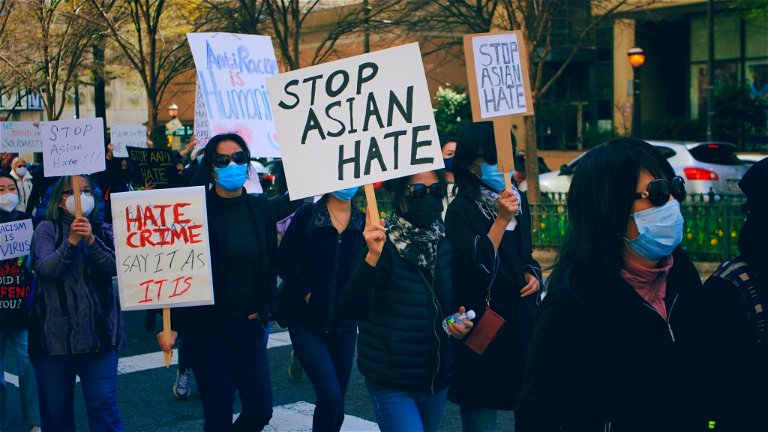Taking action in Chinatown: Chocolate shop trains employees in kung fu to combat theft and crime
Photo of Elissa Miolene
Elissa Miolene
Aug. 20, 2022

Scott McTaggert, executive chef at Jade Chocolates, attends the cafe’s first kung fu class at San Francisco WingTsun in May.
Elissa Miolene/The Chronicle
Mindy Fong shut the doors of Jade Chocolates Teahouse and Cafe at just past 5 p.m. on a weekday this spring. Fong had spent the day making chocolate, preparing pastries and serving tea. But now, she was leading her employees to a very different type of shift: their first all-staff kung fu class.
“It’s beneficial for everyone to know some self-defense,” Fong said. “I would hate for something to happen to them here just because they’ve gone to work.”
Fong decided to hold the classes in late March, after a string of robberies coincided with the cafe’s move from Inner Richmond to Chinatown. Fong was excited to move to the neighborhood, where her cafe’s Asian-inspired chocolates could find a cultural home. But immediately, it was clear to Fong that COVID-19, crime and anti-Asian hate had left their mark on the neighborhood.
“Every day, there’s something,” Fong said. “I’ve seen people being chased in the street because they’ve stolen something from the jewelry shops or camera shops.”
Robberies and assaults fell with overall crime rates in San Francisco during the pandemic, but retail break-ins in Union Square and other high-profile crimes may have made people feel less safe. And a series of assaults on Asian Americans has jolted those communities in particular.
In 2021, anti-Asian hate crimes spiked 567% in San Francisco, according to the city’s police department, with 60 attacks targeting people of Asian descent. Chinatown’s crime rate is below that of many parts of San Francisco. So far this year, the police department recorded fewer incidents in Chinatown than in 21 of the city’s 43 neighborhoods, including the Marina and Bernal Heights. But still, hate crimes against Asian residents loom large in residents’ minds.
A block from Jade Chocolates, a mural of Vicha Ratanapakdee - a 84-year-old Thai man who was pushed to the ground during his morning walk in January 2021, and died soon after - seems to watch over Grant Street. Justice for Vicha, the mural reads in big, block letters. #StandForAsians.
Compounded by that history is the day-to-day experience of business owners like Fong, who say they’ve heard of robberies happening in broad daylight, and brazen attacks against storefronts throughout the area. But still, moving back to Chinatown - a neighborhood her family called home for generations - was important to Fong.
“All of the theft and crime in Chinatown is not an obstacle for me,” Fong said. “It’s just one more thing we have to get over. We should be able to defend ourselves.”
Jade Chocolates’ executive chef, Scott McTaggert, has been practicing Wing Tsun - a style of Chinese kung fu focused on self defense - for the last six years. Instead of backing down to the crime, McTaggert and Fong thought they could use Wing Tsun to overcome it.
“Because I’m here in Chinatown with our staff and the crime rate is so high, I thought it would be advantageous to at least mention, hey, if anyone wants to learn some and get some training, this is available to you,” said McTaggert. “I will do everything I can do to make our employees feel safer and more empowered so they can live their lives without being afraid.”
At the end of May, Fong, McTaggert, and two other Jade employees - along with the daughters of two employees - headed to San Francisco WingTsun, the Chinatown-based studio where McTaggert usually practices. Joseph Mah, the head teacher of the studio, walked the employees through the practice’s foundations, coaching them through the proper movements to defend themselves. It was the first of many classes to come: Jade’s employees now hone their skills on the last Wednesday of every month.
“Hopefully, the self-defense program we’re going to establish here is just to know - not to use,” said Fong. “But if the day comes, they’ll be prepared.”
These classes are just the latest in a string of efforts to combat crime in Chinatown. According to Edward Siu, chair of the Chinatown Merchants United Association, business owners in the area are working together to reduce crime in their own ways. A WhatsApp group of 400 merchants, for example, now works as an alert system: If something happens in a shop, Siu said, a chain reaction is set off. That merchant texts the group and Siu contacts the police.
“We’re really working together, as merchants,” said Siu. “We want to make Chinatown better and get more business coming in.”
Elissa Miolene is a graduate student at Stanford University’s journalism school and a former intern with The Chronicle’s multimedia team. Twitter: @elissamio






 Reply With Quote
Reply With Quote

:quality(70)/cloudfront-us-east-1.images.arcpublishing.com/cmg/CJ4AFIB7O5GIROX3EC65OP2BGY.jpeg)



